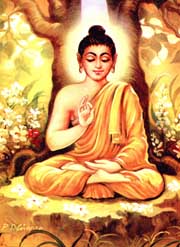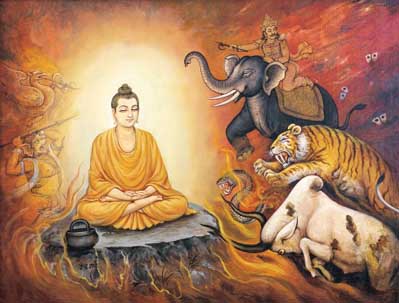 Buddha Jayanti (also known as Buddha Purnima because it is celebrated on the full moon) is the most sacred festival to Buddhists, marking Lord Buddha’s birthday, enlightenment and entrance into Nirvana. It is also known as Vesak (derived from the Sanskrit name for the month in which it falls – Vaisakha) in Sri Lanka and other Buddhist countries.
Buddha Jayanti (also known as Buddha Purnima because it is celebrated on the full moon) is the most sacred festival to Buddhists, marking Lord Buddha’s birthday, enlightenment and entrance into Nirvana. It is also known as Vesak (derived from the Sanskrit name for the month in which it falls – Vaisakha) in Sri Lanka and other Buddhist countries.
This year Buddha’s birthday is celebrated on May 2.
Till the time I read “Siddhartha” by Hermann Hesse I had known nothing about Buddha except for his name, nationality and the fact that his spiritual seeking had led him to the Truth and that is why there are lots of Buddhists nowadays who are seeking the same but, because of some reason, do not find it.
And the fact that Buddha has found the Truth inspired my respect to him.
I remember that when in the university we discussed the Buddha’s teaching. But from that seminar I grasped, frankly speaking, nothing except for the impression that nobody, including the teacher herself, completely understood what exactly Buddha had realized when he got the enlightenment.
We have recently watched the film “Little Buddha” with Keanu Reeves playing Buddha. In general, the film is quite dull but the scene of the Spirit’s fight with everything alien and the further enlightenment is very beautiful and attractive. There are three main ideas in the film:
– one should live like paying a stringed instrument: is one pulls the string tight or, vice versa, weak, there won’t be any good sound (one shouldn’t go to extremes);
– all the desires, conditionings, ego are not the true person; the only thing which is true in the man is his Spirit (from hear comes the need to fight with negative qualities);
– as soon as you learn your Spirit, you get fulfilled with love for everybody (as you see not the alien aliments in him/her but the Spirit which is always pure).

Buddha’s struggle with temptations
But we watched the film when the meaning of Buddha’s enlightenment had become clear to us:
“You have to see how He (Buddha) first felt that one has to seek something beyond life. He couldn’t understand how this misery has come and what is the need to have this misery. So He gave up his family, He gave up His luxuries of life – everything He gave up – and went in search of the Truth, as many of you have done. He would have been lost also I would say because He had read all those Upanishads, and He read all the books that were possible for Him to say what the Truth is. But He couldn’t get anything. He was a complete sanyasi in the sense that as far as the food is concerned, as far as the entertainment is concerned, everything He gave up, and ultimately the Adi Shakti gave Him Realisation because He was so true, and was one of the ones marked for a special place in the Virata. He had to achieve that. Of course I need not tell you about His previous lives; perhaps in so many of My lectures I have already talked about it – what was His previous life and how He achieved His own enlightenment about Himself. But what we have to see about His life is that He discovered and found out that want is the reason of all the myths. But He didn’t know what was the real Want, what was the pure Want, what was the pure Desire, and that’s how He could not explain to people…” (Shri Mataji, U.K., May 31, 1992).
Thought for the day: “All the creatures are longing for happiness. Thus treat everybody with compassion” (Buddha).

It is interesting to see that so many Westerners today are being hooked onto Buddhism Hinduism etc.. It speaks about the universal appeal of these religions…if one can call them. Bur I feel that these more than RELIGION, are paths of self enquiry or self awakening, liberation etc…Buddha’s universal appeal also comes from his preaching and practicing of compassion. Ironically, in today’s world we do not want to know what compassion is all about. For many of us it is only “a feeling of empathy for fellow humans or animals.” However the real Buddhist compassion has wider connotations…(if we go by words and if words mean anything). Herein it means love for all existence and if you love someone more often than not you will go out to stand by them, support them in hours of need. This, by any means, is not easy and hence Buddha’s doctrine although simple is difficult to practice. (To be continued…)
Yes, it is very true about some Westerners (but not about all of them). But unfortunately so to speak gurus do not bring real knowledge of Buddha and other Great Masters very often – just what is lying on the surface. And this knowledge cannot help Westerners to know their Spirit anyhow. On the contrary, it often misleads them.
One more thing is that it is quite surprising that Western people have turned to Buddhism, Hinduism, etc. so vigorously in their attempt to find in this teachings the truth of life not realizing that ALL GREAT MASTERS SPOKE ABOUT THE SAME THINGS! Let’s take comapssion, for example. All Christ’s life shows just the same idea. What is true religion?
As I identified it for myself when I was in my teens, it is all the ideas which are the same in the teachings and religions which the human mind has created. All the great incarnations have spoken just about the same things.
You are right saying that the ideas (compassion being among them) are simple but difficult to practice. But there is a good way how to reach it: develop the witness state, practice introspection, stop yourself from thinking and behaving in the negative way. I know, it’s a long way… I have just stepped on that path but already now I get so much joy from living! Amazingly much joy! Detached love (that is what Buddha spoke about) does not appear by the will of our mind. It appears spontaneously, in our heart. The more often you turn to your own Spirit, the easier it becomes for you to feel that love.
(To be continued… 🙂 )
That explains the spiritual context which is also well elucidated in the technique Budhdh introduced for meditating- Vipasana Meditation. The practical context entails an enlightenment of a different kind or a different know thyself- Make your passion your profession
Dear Hiren,
Some ideas in you post are very interesting, indeed. For example: “The literal meaning of the word “education” is to draw out and not to stuff in”. Yes, exactly, all the knowledge is contained within. And our task is just to awaken it.
But I cannot agree with the main idea of your post: make your passion your profession. I consider that spiritual growth should be the main aim in life, the, so to speak, passion of life.
Jesus told his disciples: “Leave everything and follow me”. It was said in regard to their work. Of course, I do not mean that one shouldn’t work. He should… not to make others suffer taking care of an idle person. But the idea is that if you are growing spiritually, you develop such a quality as detachment, detachment to what you are doing.
An example from the film “Little Buddha”: the Buddhists were making a huge picture from sand of different colours. It took them months. But as soon as the work of art had been finished they blew it off. The idea: enjoy the process, every moment of life, not the result. Thus, the work becomes insignificant for you and you can actually do any work. When you are one with your Spirit, you are joyful at any moment not depending on the circumstances.
Now we see more and more clearly that the values which we are working for and which our parents have worked for turn out to be nothing. Nothing is needed, except wisdom, for our movement along life. There are so many people who have graduated from universities but their education has not been useful for them. And there are also those who have got only 10 classes of regular school but now run big companies. And what is wisdom? You are right: everything is within :).
If you have started speaking about meditation, I will continue the topic a bit. Among all the meditations I finally chose Sahaja Yoga meditation. The reason: while practicing this kind of meditation you are absolutely aware of what is going around you, you just relax your mind – thoughtless awareness state. Due to it the Kundalini can pass through the sixth chakra and go out through the Sahasrara. This energy knows perfectly well what to cure and balance within you. Moreover, you feel what is wrong on your own fingertips. In such a way, you become your own doctor and guru.
I think ‘experience’ be it detached love is the key to your soul/spirit, by whatever name you call it. The Buddha talked about self enquiry leading to the experiential state of Nirvana. But then self-will seems to be his ‘natural’ preaching. However spontainety of heart as you talked about could also just come with an ‘Aashirwad’ or blessing/ grace as Hindus call it.
Pingback: What did Buddha mean? To keep step with Creator « Know Thyself
Thyself Says:
May 16th, 2007 at 2:27 pm
[…] to Buddha, all the sufferings come from desires. What did He mean? Should not we have any desires at […]
Sorry, to explain this Please findout about :
Tanha and Chanda (Pali)
It is said that, “Ignorance is a real limitation in life; it is a burden, a problem. In Buddhism this burden is called dukkha or suffering. Because human beings are born with ignorance, they do not really know how to conduct their lives. Without the guidance of knowledge or wisdom, they simply follow their desires, struggling at the directives of craving to stay alive in a hostile world. In Buddhism this blind craving is called tanha.
When ignorance is replaced with wisdom, it is possible to distinguish between what is of true benefit and what is not. With wisdom, desires will naturally be for that which is truly beneficial. In Buddhism, this desire for true well-being is called dhammachanda (desire for that which is right), kusalachanda (desire for that which is skillful), or in short, chanda”.
Hey may I use some of the insight found in this entry if I reference you with a link back to your site?